Return to
*North Korean Studies*
"2nd World Congress of Korean Studies"
DPRK, Pyongyang (4-5 August 2004).
| The " 2nd World Congress of Korean Studies" took place in Pyongyang between the 4th and 5th August 2004. It is difficult to claim it was a truly
"World Congress".
In 2003, the ROK Academy of Korean Studies (AKS) and DPRK Academy of Social
Sciences (ASS) reached an agreement to co-host the Congress. In addition, International Society for Korean
Studies (ISKS) agreed to conduct a role of mediator since direct communication between North and South was not permitted.
However, in late July of 2004, the DPRK notified that the AKS was not allowed to enter Pyongyang and co-host the World Congress.
The basic agreement was breached and, accordingly, the essential elements
of Congress preparation (such as financial support for participants, fund-raising, and chartered flight) became highly doubtful. In such circumstances, the original motto of the Congress -
"Korean Studies in the Era of Reconciliation and Cooperation" - was
impossible to achieve.
|
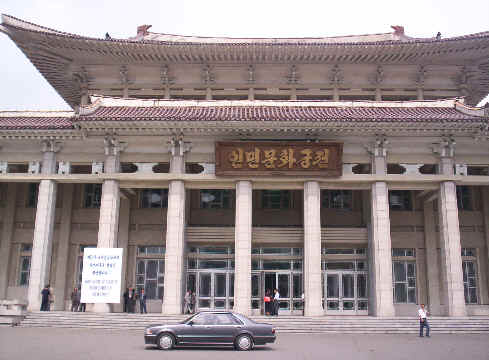 |
| Therefore, the AKS and ISKS cancelled the Congress and sponsoring organizations withdrew their sponsorship, which was notified to
DPRK. Afterwards, however, it was revealed that DPRK held a conference between August 3rd to 7th.
They made a direct contact with many applicants of the World Congress and approximately 48
(or 24, according to some sources ) of 221 applicants visited Pyongyang.
Although all the papers were delivered to and reviewed by DPRK
authority in June (they even asked the AKS to request some participants to correct certain phrases or expressions which were not appropriate for Pyongyang presentation in their
judgement), the ASS claimed that participants' papers had not been delivered to
the DPRK. Many papers were to be translated into Korean on the spot to
engage local participants into discussions. Altogether, 150 papers were presented at 9 different
panels. The " Congress" organisers also recorded a video film (PAL,
90 min.)
which features every stage of the event.
Although it was supposed to be another international conference different from the World Congress because it was organized by only DPRK without any co-hosting or sponsoring organizations, they adopted the title,
"the World Congress of Korean Studies". However, it was not the
"real" World Congress of Korean Studies. Cancellation of the World Congress was resulted from political conflict in the level of governments, not in the level of hosting organizations.
On the contrary, hosting organizations were putting an effort to co-develop Korean Studies.
For example, the AKS is fully aware that every single participant put precious time and effort on writing a paper.
Currently, diverse solutions to compensate for it such rescheduling of the Congress or publishing the proceeding are being reviewed.
In spite of any hardships, the AKS will continue the World Congress of Korean Studies because it will contribute to not only development of Korean Studies but also peace on the Korean peninsula.
|
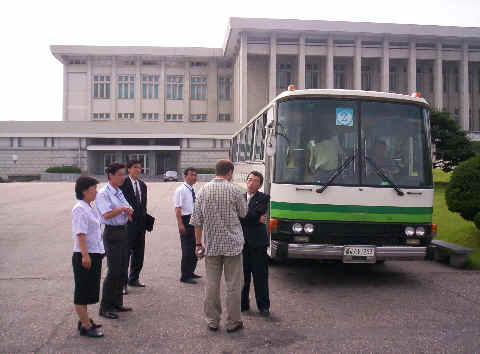 |
Pyongyang, August 3, 2004 (KCNA) -- Delegates of Russia, the United
States, China, Australia, Japan, Spain and other countries arrived here today to
attend the 2nd World Conference on Korean Studies.
Also arriving were delegates of Koreans from the United States,
China, Japan, Spain and other countries. Earlier, a delegation of the Liaoning Academy of Social Sciences of
China and a delegation of Korean social scientists in Japan arrived here. |
Scholars Hold
Meeting to Presenting Results of Research in Korean Issues
|
The Second World Congress of Korean
Studies was held in Pyongyang from August 4 to 5, participated in by more than
350 scholars, specialists and researchers of Korean studies. The congress was the academic meeting of
scholars and researchers who study Korean issues including Korean politics,
economics, history and literature.
The academic meeting was participated in
by 330 Korean scholars and researchers, 300 from the DPRK and 30 from overseas.
A total of 22 foreign scholars also attended the two-day meeting. A total of 150 theses were read in the
congress.
Panel meetings were held in nine
sections, such as philosophy, sociology and politics, economics and law,
history, literature, linguistics, ethnic art, pedagogy and culture, science and
technology. The first congress was held in Seoul,
South Korea.
|
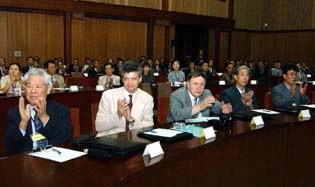
Photo shows
participants in the 2nd World Congress of Korean Studies who came from various
countries.
|
South Korean scholars were unable to
attend the meeting, because Pyongyang has restricted the entry of South Koreans
into North Korea as a countermeasure against Seoulís ban on the visit of South
Koreaís civilian party to North Korea on the occasion of the 10th anniversary
of the late President Kim Il Sung.
In the opening meeting, Thae Hyong Chol,
president of the DPRKís Social Science Institute said in his congratulatory
address that the Second World Congress of Korean Studies was of great
significance in contributing to the deepening of mutual understanding between
scholars of Korean studies and to the peace and reunification of the Korean
Peninsula.
Ro Du Chol, vice-premier of the DPRK
Cabinet, said that the meeting would bring about a good opportunity to
contribute to reunification and prosperity of Korea and the realization of peace
and stability in Northeast Asian region and the world. He also said that Korean
scholars in the North and abroad and progressive scholars in the world who study
Korean issue should bring about fresh and continuous development in Korean
studies through search and effort, disinterested mutual cooperation and
assistance.
Alexander Volontsov, the Center of
Research of Korean Studies of Institute of Eastern Studies of the Russian
Academy of Sciences, said that the meeting was of great significance in a
scientific and political point of view and would be an important opportunity to
develop academic bonds between scholars of Korean studies in the world. He also
said that the situation in the Korean Peninsula is growing tense because the
South Korean authorities interfered with the visit of a civilian consolatory
delegation to Pyongyang on the occasion of the 10th anniversary of the death of
the late President Kim Il Sung.
| Pyongyang, August 5, 2004 (KCNA) -- The Second World
Congress of Korean Studies opened in Pyongyang on Wednesday. Present there
were Vice-Premier of the Cabinet Ro Tu Chol, President of the
Academy of Social Sciences Thae Hyong Chol, senior officials in the
fields of science and education and officials concerned. Attending it are
the DPRK delegation, delegations and delegates from China, Russia, Japan,
Spain, the United States, Australia and other countries, delegations and
delegates of overseas Koreans.
Thae Hyong Chol declared the congress
open, expressing belief that the
congress, which opened in Pyongyang amidst the great interest and
expectation of world experts on Koreanology, would be a significant
congress which would lay a new milestone in further developing Koreanology.
Ro Tu Chol in his congratulatory speech hoped that
the congress would mark a new turn in studying Korea at a higher level,
strengthening solidarity among scholars studying Koreanology and thus
positively contributing to the reunification and development of the Korean
nation and achievement of peace and security of Asia and the rest of the
world.
Congratulatory speeches were also made by Alexandr Vorontsov, chief of Korean Section of the Institute of Oriental Studies of the Russian Academy of Sciences, and
Chen Longshan, president of the Jilin Provincial Center for Northeast Asia Studies, China. Panel discussions took place at the congress. They involved philosophy, socio-politics, economic law, history, literature, linguistics, folk art, education and culture and science and technology. |
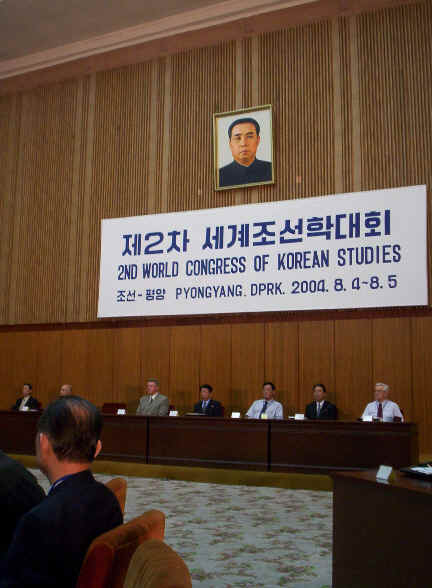
|
|
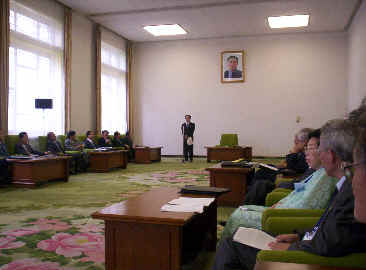
|
Delegates of the
DPRK, different countries and overseas Koreans presented many valuable papers and exchanged views on the issues of mutual concern. Speakers at the panel discussions said though they differed from each other in the fields and subjects of their studies, they should have the same great theme Koreanology should pursue at the present time when a nation-wide campaign should be conducted to achieve the country's reunification and peace through the great national unity under the banner of the June 15 North-South Joint Declaration.
The participants shared the view on boosting exchange and cooperation and strengthening the ties among world experts on Koreanology to positively contribute to firmly preserving and glorifying the
time-honored history and brilliant culture of Korea. The congress continues.
(KCNA)
|
| Pyongyang, August 5 (KCNA) -- The DPRK government gave a banquet in honor of the participants in the 2nd World Congress of Korean Studies at the People's Palace of Culture Wednesday.
Present on invitation were Korean and foreign delegations and delegates and overseas Korean delegations and delegates.
Vice-Premier of the Cabinet
Ro Tu Chol in his speech said that the Korean people are now making vigorous efforts to build a great prosperous powerful nation, overcoming difficulties, true to the Songun leadership of Kim Jong Il.
He hoped that the congress would offer an opportunity to reconfirm the advantages of the Korean nation with a history spanning 5,000 years and brilliant culture, exchange achievements and experience gained in the study of Koreanology and swap new academic views on the common development and reunification of the Korean
nation
|
. 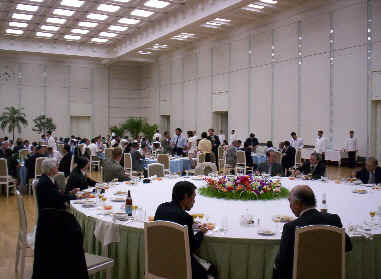 |
It is the way for Koreanology to follow in the era of reconciliation and cooperation to achieve national cooperation and reunification, he said, underscoring the need for the intellectuals living in the era of reunification to cherish this mission and devote all their wisdom and enthusiasm to bringing Koreanology into full bloom.
Pyongyang, August 6, 2004 (KCNA) -- The Second World Congress of Korean Studies closed in Pyongyang on Thursday. Prior to the closing ceremony panel discussions continued. Introduced at the panel discussions were the academic successes and experience gained in researches into issues arising in studying time-honored history and culture of the Korean nation spanning five thousand years, adhering to and inheriting and developing the excellent ideological wealth and cultural tradition created by the Korean people.
The participants discussed a lot of academic issues arising in accurately grasping and studying the modern history of the Korean nation including the foundation of the Juche idea, the originality and justice of the great Songun politics, the benevolent politics based on the idea, the line of economic construction and the line of scientific, educational and cultural construction in the Songun era, tasks and ways to achieve national reconciliation, unity and reunification of the nation as required by the era after the publication of the June 15 joint declaration.
|
A closing meeting was held at the congress. Thae Hyong Chol, president of the Academy of Social Sciences, in his speech at the closing meeting called upon all the participants to further intensify the study of Koreanology based on the successes and experience achieved at the congress and thus creditably fulfill their mission and duty as intellectuals in the era of reunification who guarantee national reconciliation, cooperation and reunification with knowledge and lead them with brush.
Then followed speeches by Sergey Kurbanov, director of the Center for Korean Language and Culture of Faculty of Oriental Studies of St-Petersburg State University of Russia,
Paek Jong Min, chairwoman of the Korean American Women Artistes and Writers Association, and
Kim Hwa Hyo, chairman of the Association of Korean Social Scientists in Japan.
A declaration adopted at the congress in the name of its participants noted that they would strive hard to make Korean studies contribute to the reconciliation and cooperation between the north and the south of Korea and to the independent and peaceful reunification of Korea under the banner of the June 15 joint declaration. The declaration said that they would work hard to deepen the study of the Korean history and culture so that Korean studies may help heighten the dignity and pride of all Koreans.
Kim Jong Yong, vice-president of the Academy of Social Sciences, made a closing address at the congress.
(KCNA) |
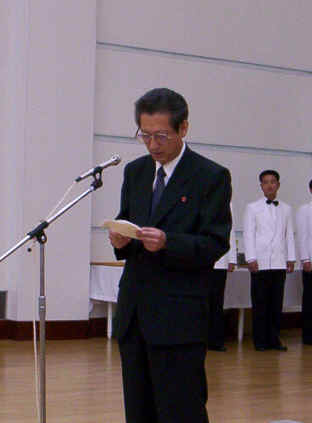
|
At the closing ceremony, the "World Congress" adopted a
"Declaration" which, after a long discussion between the foreign
participants, had been accepted only in English:
DECLARATION
We held "the 2nd World Congress of Korean Studies" in Pyongyang
from August 4 to 5, 2004 with the participation of the scholars who are engaged
in Korean studies.
Sharing the view that this Congress in which more than 150 papers were
presented by the scholars in the north of Korea, overseas Korean and foreign
scholars at 9 panels under the theme of "Korean Studies in the Era of Reconciliation
and Cooperation" was a significant Congress which contributed to the
development of the Korean studies, to the promotion of understanding and
strengthening of solidarity with the scholars who are involved in Korean
studies, we declare as follows;
- We shall strive hard to make Korean studies contribute to the
reconciliation and cooperation of the north and south of Korea and to the
independent and peaceful reunification of Korea under the banner of June 15
Joint Declaration of 2000.
- We shall endeavor to make Korean studies contribute to peace, security and
prosperity of the Korean peninsula as well as Northeast Asia and the whole
world.
- We, as scholars who value justice and truth, shall work together to deepen
the study of the Korean history and culture and to promote the development of
Korean studies to heighten the dignity and pride of all Korean people.
- We shall make our efforts to continuously hold the World Congress of Korean
Studies in the future, too, and make the Congress contribute to the development
of the Korean studies and the strengthening of the solidarity with the scholars
of the World.
Participants of the 2nd World Congress of Korean Studies
August 5, 2004. Pyongyang.
The Korean translation incited a major controversy due to the politicised usage of the term
"Choseon":
선언서 (in Korean)
우리는 조선학을
연구하는 학자들로서 2004년
8월 4일부터 5일까지
평양에서 제2차 세계
조선학대회를
진행하였다.
우리는 조선의
북과 세계 여러 나라의
학자들,
해외동포학자들이
참가하여 "화해와
협력시대의 조선학"
이라는 주제밑에 9개의
분과에서 150여건의
연구론문들을 발표한
이번 대회가 조선학을
더욱 발전시키며
조선학을 연구하는
학자들의 리해를
도모하고 련대를 강화하는데
크게 이바지한 의의있는
대회였다는데 의견을
같이하면서 다음과
같이 선언한다.
- 우리는 조선학에
대한 연구가 6.15공동선언의
기치밑에 조선의 북과
남이 화해와 협력을 강화하며
자주적평화통일을
이룩하는데 적극 기여하도록
노력 할것이다.
- 우리는 조선학에
대한 연구활동이 조선반도는
물론 동북아시아와
전세계의 평화와 안정,
번영을 이룩하는데 기여하도록
노력할것이다.
- 우리는 정의와
진리를 존중하는
학자들로서 조선 력사와
문화에 대한 연구를
더욱 깊이 있게 하여
조선학발전이
조선민족의 존엄과
긍지를 높여나가는데
이바지하도록 노력할것이다.
- 우리는
세계조선학대회를
앞으로도 계속 진행하며
그것이 조선학을 발전시키고
전세계의
조선학전문학자들의
련대성을 강화하는데
크게 기여하도록 노력할것이다.
제2차
세계조선학대회
참가자 일동
2004년 8월 5일 평양
Related articles in Korean from Rodong Sinmun:
제2차
세계조선학대회
대표단,대표들 도착
제2차
세계조선학대회 개막
제2차
세계조선학대회 페막-선언서
채택
 Return to *North Korean Studies*
Return to *North Korean Studies*






